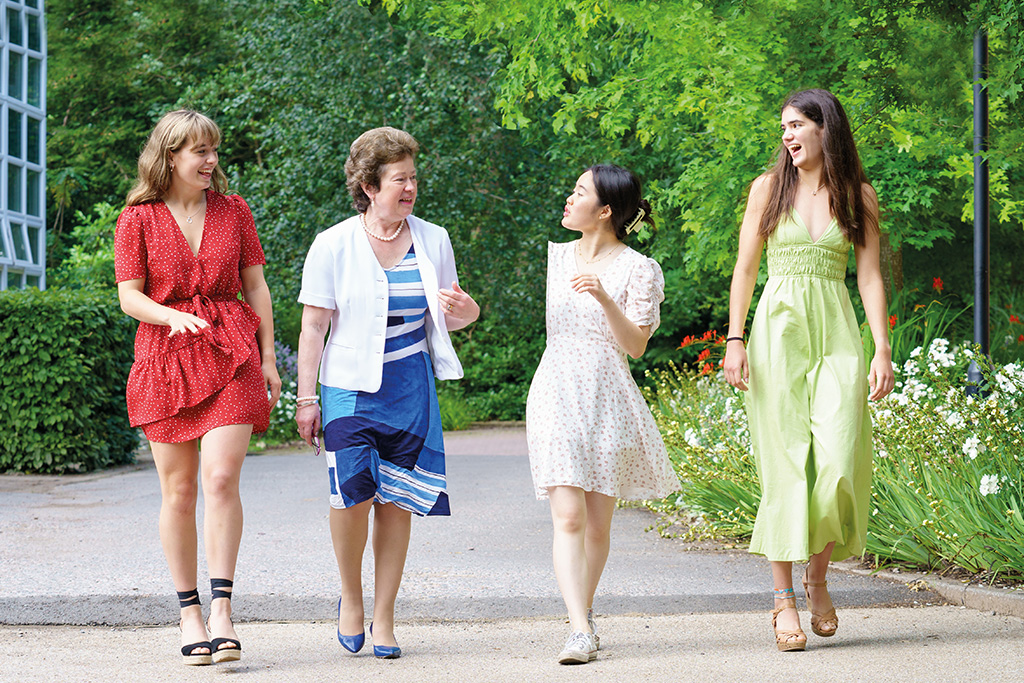Perfectionism, Easy Does It
By
3 years ago

Teaching students how to find pockets of peace in everyday life is crucial, says Alice Phillips, head of St Catherine’s School, Bramley

We have a problem with perfectionism at the moment. Students have become increasingly focused on achieving the run of 9s at GCSE and A*s at A-level. They feel their futures will be blighted prematurely if they don’t hit every bullseye in sight. Music exams must be achieved with distinction. The Duke of Edinburgh Awards must be gold. No wonder our teenagers are so stressed.
For me, I trace the genesis of this ideal back to the 1970s and the emergence of Romanian gymnast Nadia Comaneci who scored the first 10.0 in gymnastics at the Olympics. Before Comaneci stepped onto the floor or took to the beam, the idea of a perfect score was considered impossible. Surely there was always room for improvement?
Yet, Comaneci was so flawless in her technique and met every requirement of the judges so precisely that she couldn’t be marked down. Inevitably, others began to follow, and standards became even more exacting. In 2006, the scoring system had to be changed to allow gymnasts to score more than 10; they were too good for the marks on offer.
Something similar happened with academic exams recently; we moved to a system of numbers not letters for GCSE – 1–9 – creating more space for students to excel. For a lucky few, much like the most elite gymnasts, this is an opportunity to showcase their natural ability and intelligence.
Unfortunately for the overwhelming majority of students, this raising of the potential of the bar is having a different effect. It’s creating a climate of pressure where to do well is no longer enough. Remember, a 7 is the equivalent of an A. Yet, talk to many ambitious young people now and they find it hard to take pride in 7s, when they feel they should be getting the ‘top mark’, whatever that is. An A grade is no longer aspirational for them.
We put a lot of emphasis on extracurricular activities, especially those that demand utter absorption such as art or sewing. The chance to lose yourself in something physical or creative is one of the most powerful ways to recharge your brain and reduce anxiety
At the other end of the scale, we have the students who are less able now walking out with 4s and 5s at GCSE, which is horribly dispiriting for them after 12 years in education. As teachers, we have a responsibility to get our students their best marks, but I think we also have to see the wider picture. In a world of exam inflation, the need to counter that stress is greater than ever.
At St Catherine’s, that means we put a lot of emphasis on extracurricular activities, especially those which demand utter absorption: playing lacrosse, working on an art or textiles project, chess, sewing. That chance to lose yourself in something physical or creative is one of the most powerful ways to recharge your brain and reduce anxiety.
Girls here are encouraged to give as much time as possible to these kinds of activities, not least as they also offer the chance to meet one’s soulmates, to learn about work-life balance and to prepare for the workplace of the future, where soft skills such as teamwork are more valuable than recalling facts in an exam scenario.
Parents can play their part in this too. Choose your child’s school carefully, and have realistic conversations about their ability and future. Don’t demand 9s when 7s or 6s would be an achievement. Encourage non-academic skills and hobbies, and then have confidence in their teachers to offer solid guidance and support when it comes to the big decisions.
Few can achieve a perfect score in any discipline; the Comanecis of the world are outliers, not the norm. We can enjoy such brilliance and take motivation from it, but accepting the difference between reasonable aspirations and over-pressured expectations is key to producing happy, confident and successful young people, able to handle the world at large.
Alice Phillips is head of St Catherine’s School, Bramley, Surrey
See St Catherine’s Bramley’s online listing here.



